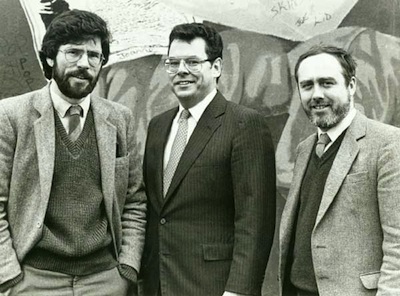
Secret British documents from 1983 show the high level of concern in London at the rise of Sinn Fein, and advanced plans to limit media opportunities for the party.
A number of documents were released by the British government from their archives this week.
One reveals how, prior to the Westminster general election in June 1983, British prime minister Margaret Thatcher moved to prevent the party gaining publicity.
She was advised in a letter that exclusion orders against Sinn Fein election candidates, Gerry Adams, Martin McGuinness and Daniel Morrison, would have to be revoked if any of them were elected to the Westminster Parliament.
The orders preventing the three entering Britain from the North of Ireland had been in place since 8 December 1982.
Guessing Adams would be the likely winner in west Belfast, the letter suggested “it will be best to revoke the order immediately the result is known” to prevent a wave of publicity over a British MP’s exclusion from Britain
In a handwritten note on the top of the letter, Thatcher agreed to the Home Office suggestion.
She wrote: “If these people are elected. I believe we have to revoke the order. But I don’t know that I am inclined to do it now. By the time the Northern Ireland count takes place we should have some idea of how things are going here. It may be necessary to consult as you suggest.”
There was also concern in British government circles in November 1982, after Gerry Adams did an interview with the BBC’s Panorama programme.
A telegram dated 24 November 1982 and labelled ‘Restricted’ expressed concerned that the Irish Times commented on “the superb mileage which Gerry Adams got when he danced around Fred Emery [BBC reporter] and secured what must be the most impressive piece of television exposure he or the political wing of the PIRA have ever had unquote”.
The confidential telegram said: “Several other people here have commented that Emery was simply not briefed for the task and the programme will have done damage both in Northern Ireland and the Republic. For these reasons, I think that the cassette should be used sparingly if at all in non-official circles.”
ESCAPED
Fears of a republican publicity breakthrough also dominated Thatcher’s response to the 1983 escape of 38 IRA prisoners of war from the H-Blocks of Long Kesh.
She declared it was “even worse than we thought” across the top of a document urging a propaganda counter-effort.
The strongly-worded advice sent by telegram from the Foreign and Commonwealth Office to its embassies and colonies stated: “You should take every opportunity to limit the propaganda benefit the IRA will reap from the outbreak... the Government regard the outbreak most seriously.”
And later in the year, Thatcher considered banning Sinn Fein entirely, despite fears that a proscribed Sinn Fein could re-emerge under another name, and that banning the party could produce mass defiance and widespread civil disobedience.
Files from 22 December 1983 show that the British Cabinet took no action on that matter -- but opted instead to look again at selective internment.
![[Irish Republican News]](https://republican-news.org/graphics/title_gifs/rn.gif)
![[Irish Republican News]](https://republican-news.org/graphics/title_gifs/harp.gif)

